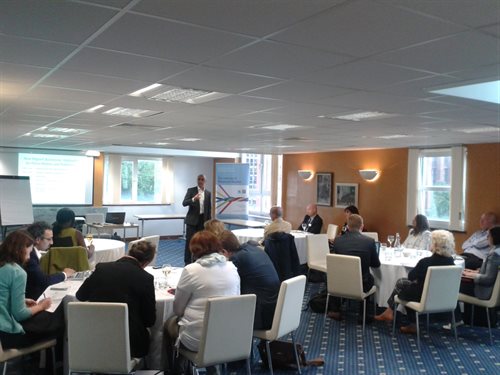New Migrant Businesses: Implications for Policy-Makers and Practitioners
The event entitled ‘New Migrant Businesses: Implications for Policy-makers and Practitioners’ was held on the 3rd of June 2014. This workshop brought together researchers and practitioners in order to explore new avenues for research in the realm of new migrant businesses. The workshop was generously funded and organised by the Institute of Advanced Studies (University of Birmingham), and supported by the Centre for Research in Ethnic Minority Entrepreneurship (CREME) (University of Birmingham) and the Enterprise Research Centre (ERC). In order to promote dialogue around key questions, the workshop brought together key researchers in the areas of immigrant entrepreneurship. Professor Ruth Milkman (City University of New York), Professor Rob Kloosterman (University of Amsterdam), Professor Ida Regalia (University of Milan), Dr Kavita Datta (Queen Mary University of London), as well as the CREME team (University of Birmingham) participated in the event.

Professor Paul Edwards and Professor Monder Ram (University of Birmingham) presented a summary of recent research projects carried out at CREME. Dr Omar Khan, acting director of the Runnymede Trust, shared key reflections about the intersection between equality, ethnicity and gender for migrant entrepreneurs. These two presentations were followed by a panel discussion featuring Scott Craig (Centre for Entrepreneurs) and Mark Beatson (Chartered Institute of Personnel and Development). Scott Craig (CFE) presented some of the key results of innovative studies commissioned by CFE, which helps to improve the public perception of migrant entrepreneurs. Mark Beatson (CIPD) shared some important ideas about how to advance a cutting-edge research agenda geared at improving the productivity and working lives of entrepreneurs and employees.
Some of the key outputs from the presentations and rich discussions at the workshop were: explication of how recent research has illuminated the main features of new migrant businesses; their key challenges and what next steps should be taken to advance a new research agenda.
What are the main characteristics of new migrant businesses in Britain?
The presentations revealed some of the main features of the new migrant enterprises in Britain. Following the study focused on high investment companies commissioned by CFE and carried out by DueDil (2014), we have learned that:
- Migrant entrepreneurs account for one in seven UK companies.
- Migrant businesses are responsible for generating around 14% of employment in Britain.
- They are twice more likely to become entrepreneurs than the British born population.
- European (Irish, German), US born, and Asian (Indian and Chinese) are the most entrepreneurial groups.
Complementing these results, research carried out by CREME on new migrants establishing businesses in the West and East Midlands shows that:
- New self-employed migrants who arrived in the last decade are born in Eastern and Western Europe (34%), South Asia (12%) and Africa (Somalia, Congo and Zimbabwe) (3%).
- They establish their businesses in sectors such as retailing and restaurants.
- Access to finance is very limited.
- Their companies have a turnover from £10,000 to £50,000 per year.
What are the key contributions new migrant businesses make to British society?
- Migrant businesses act as a buffer against the hard nature of the labour markets migrants deal with.
- Migrant businesses that employ other migrants facilitate training as well as the transmission of skills and resources to other potential entrepreneurs.
- Migrant businesses as a vehicle for social integration, building relationships with the local population and other public institutions.
- Migrant businesses as a means of promoting social cohesion, establishing their firms in areas of the city vacated by local entrepreneurs, and bringing new services and goods to the community.
What are the main challenges that migrant entrepreneurs need to overcome?
- Insufficient access to finance to sustain and expand the business.
- Detachment from mainstream networks might limit the possibilities for growth, particularly outside the co-ethnic community.
- Language barrier is an important issue for some entrepreneurs of minority groups.
- Serving your own community sometimes limits growth and diversification of products offered.
- Difficulties in accessing legal status might block setting formal business activities.
Next steps: How should we move forward a policy relevant research agenda?
- Investigate what is the nature of the contribution migrant entrepreneurs make to Britain.
- Map the different business types in Britain, given the large heterogeneity of these activities at both the high and low end.
- Explore how new migrant businesses can be supported to be competitive and innovative.
- Understand how migrant enterprises make use of transnational networks located in different spaces in Europe and beyond.
- Learn about the mentoring needs of migrant entrepreneurs so they can work towards the type of employers they want to be.
- Institutionalise existing networks of policy-makers, practitioners and universities through research initiatives in the framework of engaged scholarship.
Please contact Liz Frost, CREME’s Centre Manager, at: E.C.Frost@bham.ac.uk for a copy of the full event report or for further information about CREME.